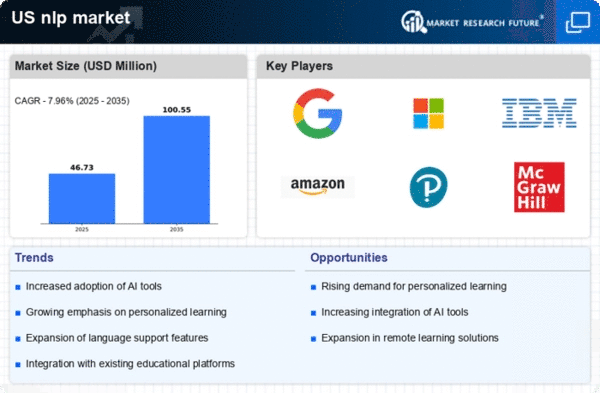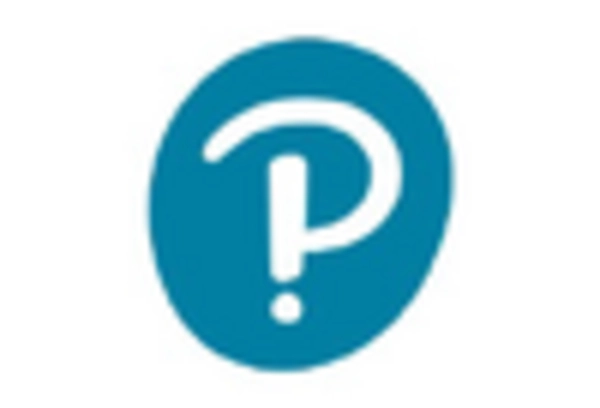Focus on Student Engagement
A heightened focus on student engagement is emerging as a critical driver in the nlp in-education market. Educators are increasingly aware that engaged students are more likely to succeed academically. Consequently, NLP technologies are being leveraged to create interactive and immersive learning environments. For instance, gamified learning platforms that utilize NLP can enhance student participation and motivation. Data indicates that engaged students can lead to a 20% increase in academic performance, underscoring the importance of engagement strategies. This trend suggests that the nlp in-education market will continue to evolve, with a strong emphasis on tools that foster active learning and student involvement.
Integration of AI Technologies
The integration of AI technologies into the nlp in-education market appears to be a driving force, as educational institutions increasingly adopt advanced tools to enhance learning experiences. AI-driven applications can analyze student data to provide personalized feedback, thereby improving educational outcomes. According to recent studies, the market for AI in education is projected to reach $6 billion by 2027, indicating a robust growth trajectory. This trend suggests that educational institutions are recognizing the potential of AI to transform traditional teaching methods, making learning more engaging and effective. As AI technologies continue to evolve, their application in the nlp in-education market is likely to expand, offering innovative solutions that cater to diverse learning needs.
Demand for Language Proficiency
The growing demand for language proficiency in a globalized world is significantly impacting the nlp in-education market. As businesses increasingly seek employees with strong language skills, educational institutions are responding by incorporating NLP tools that facilitate language learning. Reports indicate that the language learning market is expected to grow by 15% annually, reflecting the urgency for effective language education. NLP technologies, such as chatbots and virtual tutors, are being utilized to provide real-time language practice and feedback, enhancing the learning experience. This trend suggests that the nlp in-education market is well-positioned to meet the rising demand for language proficiency, thereby attracting more learners and institutions to adopt these innovative solutions.
Growth of Online Learning Platforms
The proliferation of online learning platforms is reshaping the nlp in-education market. As more learners turn to digital solutions for education, the demand for NLP tools that facilitate online learning is increasing. The online education market is projected to reach $350 billion by 2025, highlighting the shift towards digital learning environments. NLP technologies are being integrated into these platforms to provide personalized learning experiences, adaptive assessments, and real-time feedback. This trend indicates that the nlp in-education market is likely to benefit from the growing acceptance of online education, as institutions seek to enhance their offerings with advanced NLP capabilities.
Emphasis on Data-Driven Decision Making
An emphasis on data-driven decision making is becoming increasingly prevalent in the nlp in-education market. Educational institutions are leveraging data analytics to inform teaching strategies and improve student outcomes. By utilizing NLP tools to analyze student performance data, educators can identify trends and tailor their approaches accordingly. This shift towards data-driven methodologies is supported by research indicating that data-informed decisions can lead to a 15% improvement in student achievement. As educational institutions continue to prioritize data analytics, the nlp in-education market is likely to see a surge in demand for tools that facilitate effective data utilization.
















